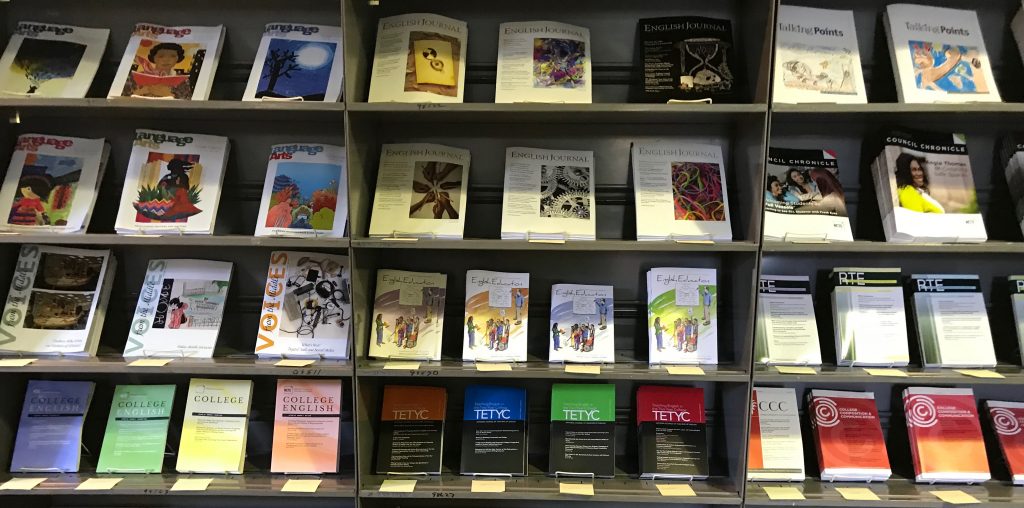During February, the month of the African American Read-In, we continue our theme of spotlighting connections with thoughtful NCTE texts.
“Hip-Hop and the Decolonial Possibilities of Translingualism” by Esther Milu from College Composition and Communication
Drawing on Kenyan hip-hop, this article (1) illustrates the decolonial possibilities of translingualism, including paths to linguistic decolonization; (2) showcases how translingualism can facilitate the recovery of Indigenous hybrid languaging practices; (3) highlights how global Western capitalism threatens translingualism’s decolonial potential; and (4) offers further implications for rhetoric and writing scholars and teachers.
“(Re)Active Praxis: What Happens When You Read about Racism?” by Madison Gannon, Jennifer Ervin, and Lemell Overton from English Education
This reflective essay explores three graduate students’ experiences hosting an antiracist teaching book club with preservice English language arts teachers in the spring of 2021. The book club centered on practical advice for engaging secondary students through antiracist pedagogies while meeting the expectations placed on new teachers. Through reflection, the authors found the book club opened a space for critical conversations on their own responsibilities as antiracist educators.
“#BlackGirlLiteratureMatters: Exploring the Multiplicities of Black Girlhood” by Christian M. Hines and Doricka L. Menefee from English Journal
Two Black teacher educators discuss the importance of centering Black girl narratives on happiness, joy, and ingenuity.
“Critical Conversations on Cutting Texts: Talking to Teachers about What Needs to Go and the Issue with Yesteryear’s English Class” by Cathline Tanis from English Leadership Quarterly
This article details how one English language arts supervisor came to reimagine how to approach English text selection practices. The author details her own journey before providing examples and strategies for other English leaders in challenging traditional English curriculum.
“Looking Back and Learning Forward: Cultivating Robust Literacy Instruction and Joy among Black Elementary Boys” by Sakeena Everett and Tamara Moten from Language Arts
Two Black women literacy educators engage in literacy teaching and learning with fourth grade Black boys to cultivate their intellectual curiosities and joy.
Research in the Teaching of English, Vol. 57, No. 1, August 2022
For this issue devoted to Black Origin Stories and Futures, the editors asked Black education scholars across multiple generations to consider radical futures of Black literacies and Black education in a conversation centered upon the Black studies imperatives of self-determination and self-awareness.
“A Conversation with Dr. Gloria Boutte and Dr. April Baker-Bell” by Natasha Thornton and Anna Osborn from Talking Points
This interview draws us deeper into the work of Black Language and Black Language speakers and urges whole language educators to create spaces that foster linguistic justice.
“Renewing the Promise at Open Access Institutions: Frameworks for Engaging Locally Responsive Writing Instruction” by Justin Jory from Teaching English in the Two-Year College
This essay shows how one English department used open educational resources and threshold theory to engage locally responsive writing instruction and increase access at a community college.
“Quilting the Way to Freedom: Flexibility in the Middle School Classroom” by Stephanie Robillard and Antero Garcia from Voices from the Middle
Teaching as a liberatory practice assists students in their journey toward freedom. Much like abolitionist quilters on the Underground Railroad, teachers who mix flexibility and creativity can support students’ opportunities to dream and plan for their futures.
Thanks for checking out these NCTE journal articles! Take time to learn more about all of the NCTE journals.
Looking for more resources around the African American Read-In? Check out our toolkit!
It is the policy of NCTE in all publications, including the Literacy & NCTE blog, to provide a forum for the open discussion of ideas concerning the content and the teaching of English and the language arts. Publicity accorded to any particular point of view does not imply endorsement by the Executive Committee, the Board of Directors, the staff, or the membership at large, except in announcements of policy, where such endorsement is clearly specified.

